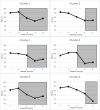Effectiveness of a Web-Based Self-Guided Intervention (MINDxYOU) for Reducing Stress and Promoting Mental Health Among Health Professionals: Results From a Stepped-Wedge Cluster Randomized Trial
- PMID: 39899345
- PMCID: PMC11833273
- DOI: 10.2196/59653
Effectiveness of a Web-Based Self-Guided Intervention (MINDxYOU) for Reducing Stress and Promoting Mental Health Among Health Professionals: Results From a Stepped-Wedge Cluster Randomized Trial
Abstract
Background: The high levels of sustained stress that health professionals often experience are a significant risk factor for developing mental health problems, such as anxiety, depression, and somatic symptoms, that not only affect their well-being but also have major social and organizational consequences. Different interventions, including those based on third-wave psychotherapy principles (ie, mindfulness, compassion, and acceptance), have proven to be effective in reducing stress in this population. Among them, those delivered on the web constitute a promising alternative with notable advantages in accessibility and flexibility, but some adherence inconveniences may limit their efficacy.
Objective: This study aimed to evaluate the effectiveness of the MINDxYOU program, a web-based self-guided intervention based on third-wave psychotherapy principles, to reduce perceived stress and promote mental health in a sample of health professionals.
Methods: In a stepped-wedge cluster randomized design, 357 health professionals from health centers in Aragon and Málaga, Spain, were recruited. They were divided into 6 clusters-3 per region-and randomly assigned to 1 of the 3 sequences, each starting with a control phase and then transitioning to the intervention phase (the MINDxYOU program) after 8, 16, or 24 weeks. This self-guided, web-based program, designed to be completed over 8 weeks, included weekly contact (via WhatsApp, call, or email) from the research team to promote adherence. Participants were assessed on the web every 8 weeks for 5 assessments. Perceived stress was the study's primary outcome, with additional measures of clinical factors (anxiety, depression, and somatization) and process variables (resilience, mindfulness, compassion, and acceptance).
Results: The program was initiated by 229 participants, 112 (48.9%) of whom were completers (ie, completed at least 3 of the 4 modules). Perceived stress demonstrated a significant reduction both when considering the entire sample (β=-1.08, SE 0.51; P=.03) and the sample of completers (β=-1.84, SE 0.62; P=.003). The proportion of participants reflecting "low stress" increased after the treatment (n=90, 46.6% vs n=100, 28.8% at baseline). Intracluster analysis revealed that pre- versus postintervention moderate effects were present in 2 clusters (Cohen d=0.46 and 0.62), and these were maintained in subsequent assessments. The linear mixed-effects models also showed that depression, anxiety, and somatization, as well as resilience, self-compassion, and some mindfulness facets, experienced significant improvements (P<.05) when comparing the intervention and control phases.
Conclusions: The MINDxYOU program was effective in reducing perceived stress and promoting mental health, as well as increasing resilience, mindfulness facets, and self-compassion. These effects suggest that participants experienced a tangible improvement that could potentially enhance their well-being. Adherence to the intervention was moderate, while program use was notable compared to similar interventions. Finding ways to promote adherence to the intervention would contribute to increasing the effectiveness of this program.
Trial registration: ClinicalTrials.gov NCT05436717; https://clinicaltrials.gov/study/NCT05436717.
International registered report identifier (irrid): RR2-10.1186/s12912-022-01089-5.
Keywords: eHealth; health professionals; mental health; randomized controlled trial; stepped-wedge design; stress; stress reduction; web-based intervention.
©Yolanda López-del-Hoyo, Selene Fernández-Martínez, Adrian Perez-Aranda, Alicia Monreal-Bartolomé, Alberto Barceló-Soler, Loreto Camarero-Grados, Carilene Armas-Landaeta, José Guzmán-Parra, Vera Carbonell, Daniel Campos, Xinyuan Chen, Javier García-Campayo. Originally published in the Journal of Medical Internet Research (https://www.jmir.org), 03.02.2025.
Conflict of interest statement
Conflicts of Interest: None declared.
Figures
References
-
- Cullen W, Gulati G, Kelly BD. Mental health in the COVID-19 pandemic. QJM. 2020 May 01;113(5):311–2. doi: 10.1093/qjmed/hcaa110. https://europepmc.org/abstract/MED/32227218 5813733 - DOI - PMC - PubMed
-
- Mental health considerations during COVID-19 outbreak. World Health Organization. 2020. [2024-04-29]. https://www.who.int/docs/default-source/coronaviruse/mental-health-consi... .
-
- Karasu F, Öztürk Çopur E, Ayar D. The impact of COVID-19 on healthcare workers' anxiety levels. Z Gesundh Wiss. 2022;30(6):1399–409. doi: 10.1007/s10389-020-01466-x. https://europepmc.org/abstract/MED/33425658 1466 - DOI - PMC - PubMed
Publication types
MeSH terms
Associated data
LinkOut - more resources
Full Text Sources
Medical
Miscellaneous



